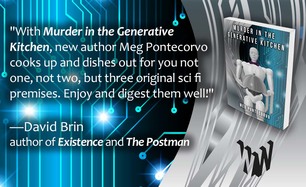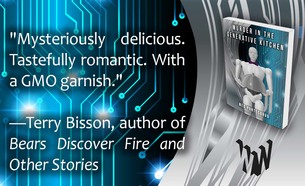 Guest post by Meg Pontecorvo What's cooking? My novella, Murder in the Generative Kitchen — oh, wait. It’s done — and ready to serve! For quite some time now, I’ve measured the ingredients with care, chopped, sifted, stirred, adjusted the seasonings, then, hmm, baked? Braised? Simmered? No, now that the novella is finished, I need to can the food analogies--except, obviously, they’re too tempting. Indeed, early reviewers have also yielded to the temptation, perhaps impossible to resist, given the novella’s theme of cooking in the future. But no — I’ll set Murder in the Generative Kitchen on the back burner for a minute to marvel at how often we adopt food analogies to describe our experience with books, no matter the subject. Some books we devour; others leave a sour taste in our mouths. Clever plotting is delicious, while poor plotting — as full of holes as Swiss cheese — is hard to swallow. We commonly say that readers are voracious, especially readers of genre fiction, who may relish one particular genre — say, Thrillers or Mysteries — and find other genres stomach-turning. Romance novels can be sweet, or spicy, or both. If habitual readers go too long without a book, we feel starved, and crave the next one. I know that some reviewers dismiss genre fiction as being as addictive as potato chips (and therefore not nutritious). But we genre readers take such judgments with a grain of salt — or, really, a whole shaker full. Good Science Fiction, in particular, offers plenty of food for thought, and food for thought doesn’t have to be unpalatable gruel. Having acquired the taste for genre fiction, we savor every page.  Oh no — now food metaphors themselves are becoming like those potato chips. But seriously, I find it fascinating that food analogies lend themselves so easily to how we understand, and try to describe, book consumption. In their fascinating study, Metaphors We Live By, linguists George Lakoff and Mark Johnson would classify them as a structural metaphor “ideas are food”: one of the ways we try to make abstract experience concrete. Perhaps such a classification is especially appropriate for those of us who read e-books, which lack physical presence in the world. But for the rest of us, a book is a physical object experienced through the senses: the size and weight of the volume in the hand, the look of the art on the covers and of the typeface on the pages, the smell and feel of the paper. We take books with us to the most intimate, yet ordinary, places: we curl up with them in bed; we balance them above the water in our baths; we prop them on the kitchen table during meals. So associating books with a physical need, like eating, feels logical — and natural. Books nourish us. With that in mind, I will take Murder in the Generative Kitchen off of the back burner and place it, with a flourish, on the table: your table. As a novella, it’s not a banquet, nor is it fast food, but mixed, instead, to be “just right.” And no, don’t expect this rather dystopian satire to be Chicken Soup for the Soul (a series that I think of as cheezy). But I hope the book gives you pleasure — and, yes, food for thought. Will there be dessert? Not yet — but I’m planning a second course. So please, pardon me while I slip back into the kitchen — to cook up the sequel!  A writer and artist dedicated to multiple genres, Meg Pontecorvo earned an MFA in Poetry Writing from Washington University in St. Louis and is a 2010 graduate of the Odyssey Writing Workshop. Meg has published a novelette, “Grounded,” in Asimov’s, and her artwork in collage and pen has been featured in experimental video performances in the Bay Area. A native of Philadelphia, she grew up in the Midwest and now shares a small apartment with her partner and cats in San Francisco, where she cooks in a tech-free kitchen.
0 Comments
Your comment will be posted after it is approved.
Leave a Reply. |
World Weaver PressPublishing fantasy, paranormal, and science fiction. Archives
February 2024
|
- Home
-
Books
-
All Books
>
- Beyond the Glass Slipper
- Bite Somebody
- Bite Somebody Else
- Black Pearl Dreaming
- Cassandra Complex
- Causality Loop
- Clockwork, Curses, and Coal
- Continuum
- Corvidae
- Cursed: Wickedly Fun Stories
- Dream Eater
- Equus
- Fae
- Falling of the Moon
- Far Orbit
- Far Orbit Apogee
- Fractured Days
- Frozen Fairy Tales
- Glass and Gardens: Solarpunk Summers
- Glass and Gardens: Solarpunk Winters
- Grandmother Paradox
- Grimm, Grit, and Gasoline
- Haunted Housewives
- Heir to the Lamp
- He Sees You When He's Creepin': Tales of Krampus
- Into the Moonless Night
- Jack Jetstark's Intergalactic Freakshow
- King of Ash and Bones (ebook)
- Krampusnacht
- Last Dream of Her Mortal Soul
- Meddlers of Moonshine
- Mothers of Enchantment
- Mrs Claus
- Multispecies Cities
- Murder in the Generative Kitchen
- Recognize Fascism
- Scarecrow
- Sirens
- Shards of History
- Shattered Fates
- Skull and Pestle
- Solarpunk (Translation)
- Solarpunk Creatures
- Solomon's Bell
- SonofaWitch!
- Speculative Story Bites
- Trenchcoats, Towers, and Trolls
- Weredog Whisperer
- Wolves and Witches
- Anthologies and Collections
- Novels
- Novellas
- Fairy Tale
- Fantasy
- Romance
- Science Fiction
- Urban/Contemporary Fantasy
- Young Adult SFF
-
All Books
>
- Blog
- About
- Contact
- Press / Publicity
- Newsletter Signup
- Privacy Policy
- Store

 RSS Feed
RSS Feed